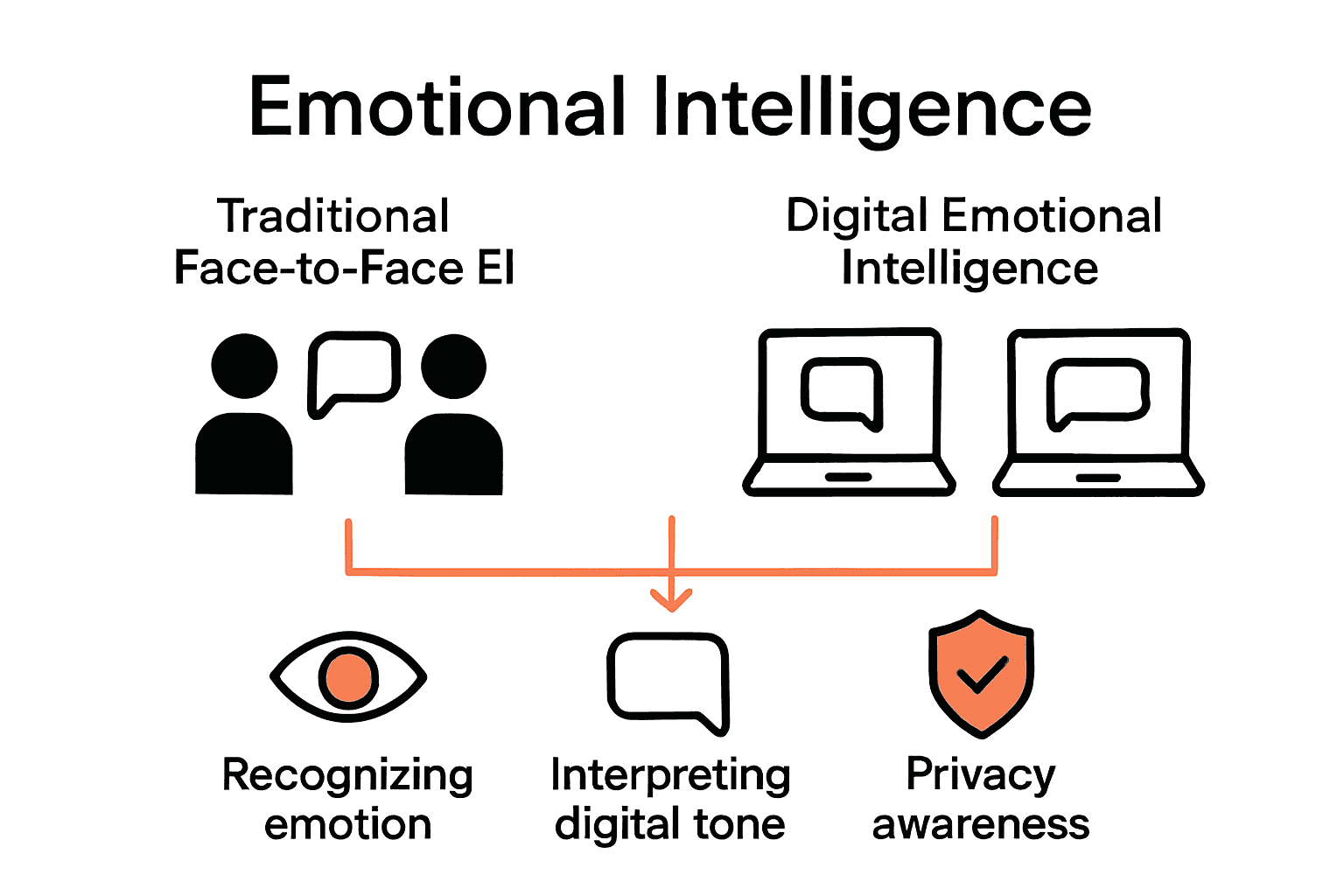Oct 15, 2025
Complete Guide to Emotional Awareness in Digital Age
Comprehensive guide to emotional awareness in digital age. Learn definitions, real-world uses, AI coaching, privacy, digital EQ skills, risks, and common mistakes.

Complete Guide to Emotional Awareness in Digital Age
Over 80 percent of communication now happens online, yet many people still struggle to connect emotionally through a screen. As we spend more time in digital spaces, emotional awareness has become a vital skill for healthy relationships and mental well-being. New research into digital emotional intelligence reveals how technology can enhance empathy, deepen connections, and help us make sense of our feelings even in virtual conversations.
Key Takeaways
Point | Details |
|---|---|
Digital Emotional Intelligence (dEI) | dEI is essential for navigating emotions in both physical and digital environments, intertwining emotional intelligence with digital competency. |
Core Skills for Digital Engagement | Key skills include digital content evaluation and nonverbal digital communication, crucial for understanding emotional nuances in text-based mediums. |
AI Coaching Tools | AI coaching tools enhance emotional awareness by providing personalized and empathetic interactions, offering accessible support. |
Privacy and Ethical Considerations | Awareness of privacy risks and potential psychological dependencies is critical when using digital emotional intelligence tools, necessitating a balanced approach. |
Table of Contents
Defining Emotional Awareness In Digital Age
Variations Of Digital Emotional Awareness Tools
Core Skills And Digital Emotional Intelligence
How Ai Coaches Enhance Emotional Awareness
Privacy, Risks, And Common Mistakes In Digital Eq
Defining Emotional Awareness in Digital Age
The digital landscape has radically transformed how we perceive, process, and express emotions. Digital emotional intelligence (dEI) emerges as a critical skill set that extends beyond traditional emotional understanding. According to research published in Frontiers in Psychology, dEI represents the sophisticated integration of emotional intelligence with digital competence—requiring individuals to navigate complex emotional terrains across both physical and virtual environments.
In practical terms, digital emotional awareness means developing the ability to:
Recognize emotional nuances in text-based communications
Understand context and tone in digital interactions
Manage emotional responses across different digital platforms
Maintain authentic emotional connections despite technological mediation
Interestingly, research on digital psychotherapy indicates that technological mediums do not inherently diminish emotional depth. Digital platforms can actually support and enhance emotional recognition when utilized thoughtfully. The key is learning to translate traditional emotional intelligence skills into digital contexts, recognizing that empathy, understanding, and genuine connection remain possible—just through different communication channels.
The modern emotional awareness journey requires both technological literacy and profound self-understanding. As digital interactions become increasingly complex, developing nuanced digital emotional intelligence isn’t just advantageous—it’s becoming essential for meaningful personal and professional relationships.
Variations of Digital Emotional Awareness Tools
Emotion AI technology represents a groundbreaking frontier in digital emotional awareness, offering sophisticated tools that transcend traditional psychological assessment methods. Learn more about emotional intelligence tools, which are revolutionizing how we understand and interact with our emotional landscapes.
Key Digital Emotional Awareness Platforms
Several innovative tools are reshaping emotional intelligence in the digital realm:
Here’s a comparison of leading digital emotional awareness tools:
Platform | Core Technologies | Key Features |
|---|---|---|
Affectiva’s Emotion AI | Deep learning | Facial analysis |
Reflexion Platform | AI-powered analysis | Real-time emotion detection |
Affectiva’s Emotion AI: Utilizes deep learning and computer vision to detect emotions through:
Facial expression analysis
Vocal tone interpretation
Body language recognition
Cross-cultural emotional mapping
Reflexion Platform: An AI-powered system that facilitates emotional literacy through:
Real-time emotion detection
Reflective psychological prompting
Metaphorical storytelling techniques
Autonomous self-reflection mechanisms
According to research, these digital tools aren’t just technological novelties—they represent a profound shift in emotional understanding. By leveraging advanced algorithms and machine learning, they provide unprecedented insights into human emotional experiences, breaking down complex psychological states into measurable, actionable data.

The future of emotional awareness lies in these intelligent, adaptive systems that can recognize, interpret, and support our emotional journeys across digital and physical environments. As technology continues to evolve, we can expect even more nuanced and empathetic digital tools that help us better understand ourselves and our emotional responses.
Core Skills and Digital Emotional Intelligence
Digital emotional intelligence (dEI) goes far beyond traditional emotional understanding, representing a sophisticated set of skills uniquely adapted to our interconnected technological world. Learn more about emotional intelligence skills for families, which can help develop these critical capabilities across generations.
Critical Components of Digital Emotional Intelligence
Research highlights several core skills essential for navigating emotional landscapes in digital environments:
Digital Content Evaluation
Distinguishing credible from misleading information
Understanding contextual emotional nuances
Recognizing potential emotional manipulation
Nonverbal Digital Communication
Interpreting tone in text-based interactions
Reading emotional subtext in digital messages
Understanding subtle communication cues
According to a cross-sectional academic study focusing on university students, emotional intelligence combined with digital literacy directly correlates with better stress management and academic performance. This research underscores how digital self-regulation has become a crucial skill in managing emotional experiences across online and offline domains.
The landscape of emotional intelligence is evolving. Where once emotional awareness was confined to face-to-face interactions, digital natives must now develop a more nuanced, technologically mediated emotional skill set. Success in personal and professional spheres increasingly depends on our ability to navigate complex digital emotional terrain—understanding not just what is said, but how it is communicated across increasingly sophisticated technological platforms.

How AI Coaches Enhance Emotional Awareness
Artificial Intelligence coaching represents a revolutionary approach to emotional development, transforming how individuals understand and interact with their inner emotional landscapes. Learn more about understanding emotional coaching, which explores the nuanced ways technology can support personal growth.
Key Mechanisms of AI Emotional Support
AI coaching tools leverage advanced technologies to enhance emotional awareness through several innovative strategies:
Emotion Recognition Technologies
Deep learning emotion classifiers
Contextual response generation
Personalized empathetic interactions
Supportive Conversational Dynamics
Providing non-judgmental listening spaces
Offering perspective-based reflections
Generating adaptive emotional guidance
According to a longitudinal research study examining commercially available AI tools, these digital agents demonstrate remarkable potential in emotional support. Participants reported increased perceived empathy and comfort in seeking digital emotional guidance, highlighting the transformative potential of well-designed AI conversational systems.
The future of emotional awareness lies in these intelligent, adaptive technologies that can provide nuanced, personalized emotional insights. Unlike traditional therapeutic models, AI coaches offer continuous, accessible support—breaking down barriers of time, geography, and personal inhibitions. By combining sophisticated emotion detection algorithms with empathetic communication strategies, these digital companions are redefining how we understand, process, and grow through our emotional experiences.
Privacy, Risks, and Common Mistakes in Digital EQ
Digital emotional intelligence is a powerful tool, but it comes with significant ethical considerations and potential pitfalls. Learn more about communication risks in AI technologies, which explores the nuanced challenges of technological emotional interactions.
Key Privacy and Emotional Risks
Navigating digital emotional intelligence requires understanding critical risks:
Emotional Surveillance Concerns
Workplace affect recognition tools
Potential loss of emotional privacy
Transformation of emotions into manageable data
Psychological Dependency Risks
Potential for increased loneliness
Over-reliance on AI emotional support
Reduced human interpersonal interactions
According to research examining heavy AI chatbot users, prolonged engagement with emotionally expressive digital platforms can lead to unexpected psychological consequences. Specifically, individuals might experience heightened feelings of isolation and develop unhealthy emotional dependencies on artificial conversational agents.
The critical challenge lies in maintaining a balanced approach to digital emotional tools. While these technologies offer unprecedented insights and support, they cannot replace genuine human connections. Responsible use requires setting clear boundaries, maintaining critical awareness of AI limitations, and prioritizing real-world emotional interactions. The goal is to use digital EQ as a complementary tool for growth, not a substitute for authentic human emotional experiences.
Take Control of Your Digital Emotional Awareness with Wisdom
Do you find it tough to truly understand what people mean in text messages, emails, or online chats? As highlighted in our complete guide, navigating emotional nuances in digital spaces demands more than basic communication skills. The pain points are real: digital misunderstandings, trouble with emotional tone, and the constant challenge of building authentic connections online. Emotional intelligence apps and traditional tools often fall short when you need immediate, context-aware guidance.

If you are ready to turn these challenges into strengths, now is the time to experience the Wisdom App. Wisdom acts as your intelligent AI emotional coach right inside WhatsApp, offering live emotion detection, real-time advice, and personalized support. It recognizes relationship types, picks up on emotional dynamics, and transforms ordinary chats into opportunities for personal growth. Visit Wisdomnow.co to see how you can boost your digital emotional intelligence today. If you want to learn more about the practical tools and skills discussed in this article, explore our dedicated resource on emotional intelligence tools before you get started.
Frequently Asked Questions
How can I develop digital emotional awareness?
Digital emotional awareness can be developed by recognizing emotional nuances in text communications, understanding context and tone, managing emotional responses on various platforms, and maintaining authentic emotional connections in digital interactions.
What are the core skills associated with digital emotional intelligence (dEI)?
Core skills of digital emotional intelligence include digital content evaluation, nonverbal digital communication, and the ability to distinguish between credible and misleading emotional information.
How do AI coaching tools enhance emotional awareness?
AI coaching tools enhance emotional awareness by leveraging emotion recognition technologies and providing supportive conversational dynamics that foster empathy and personalized guidance, allowing for continuous emotional support.
What are the risks associated with digital emotional intelligence?
Key risks include emotional surveillance concerns, potential loss of emotional privacy, psychological dependency on AI emotional support, and a decreased quality of human interpersonal interactions.
Recommended








